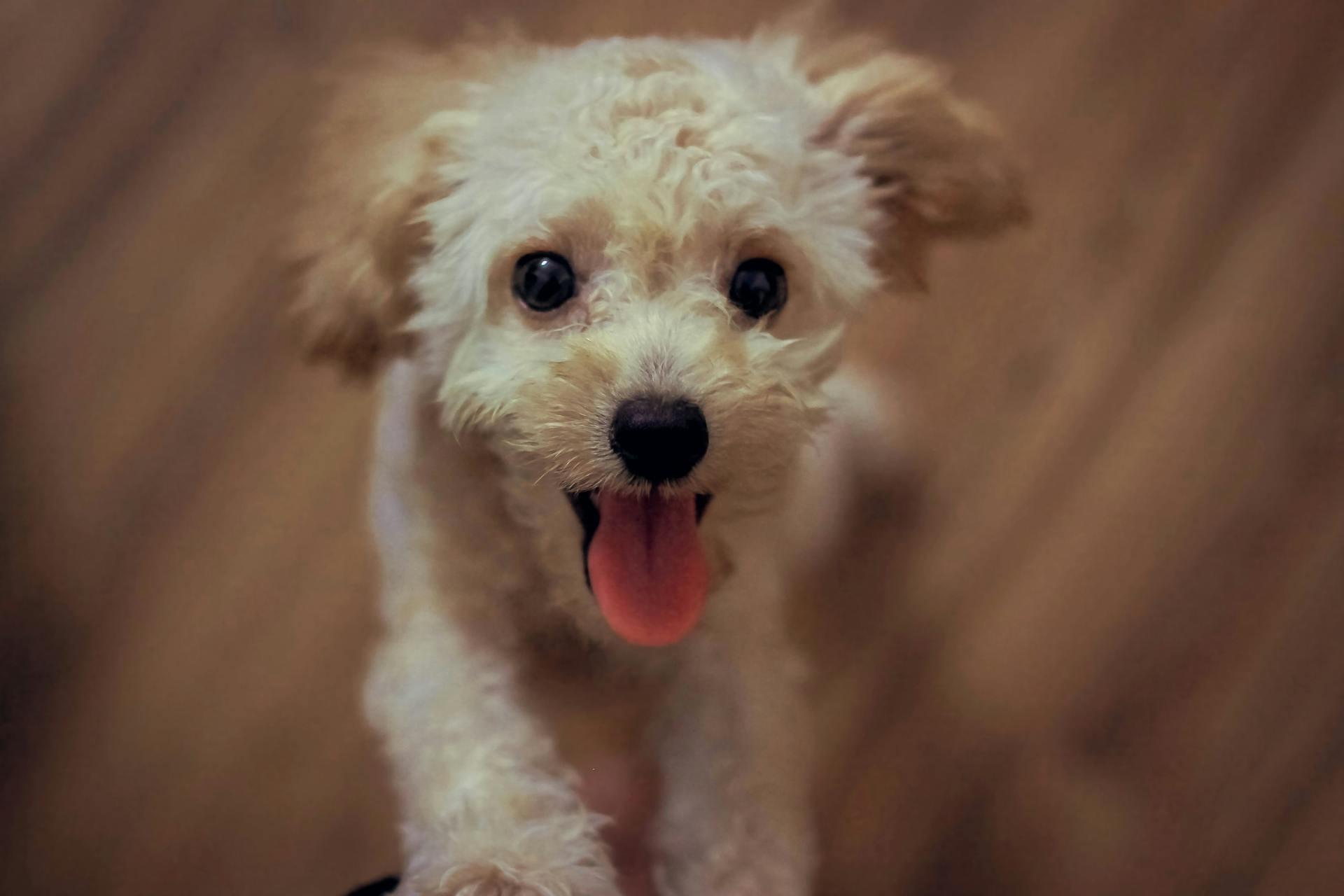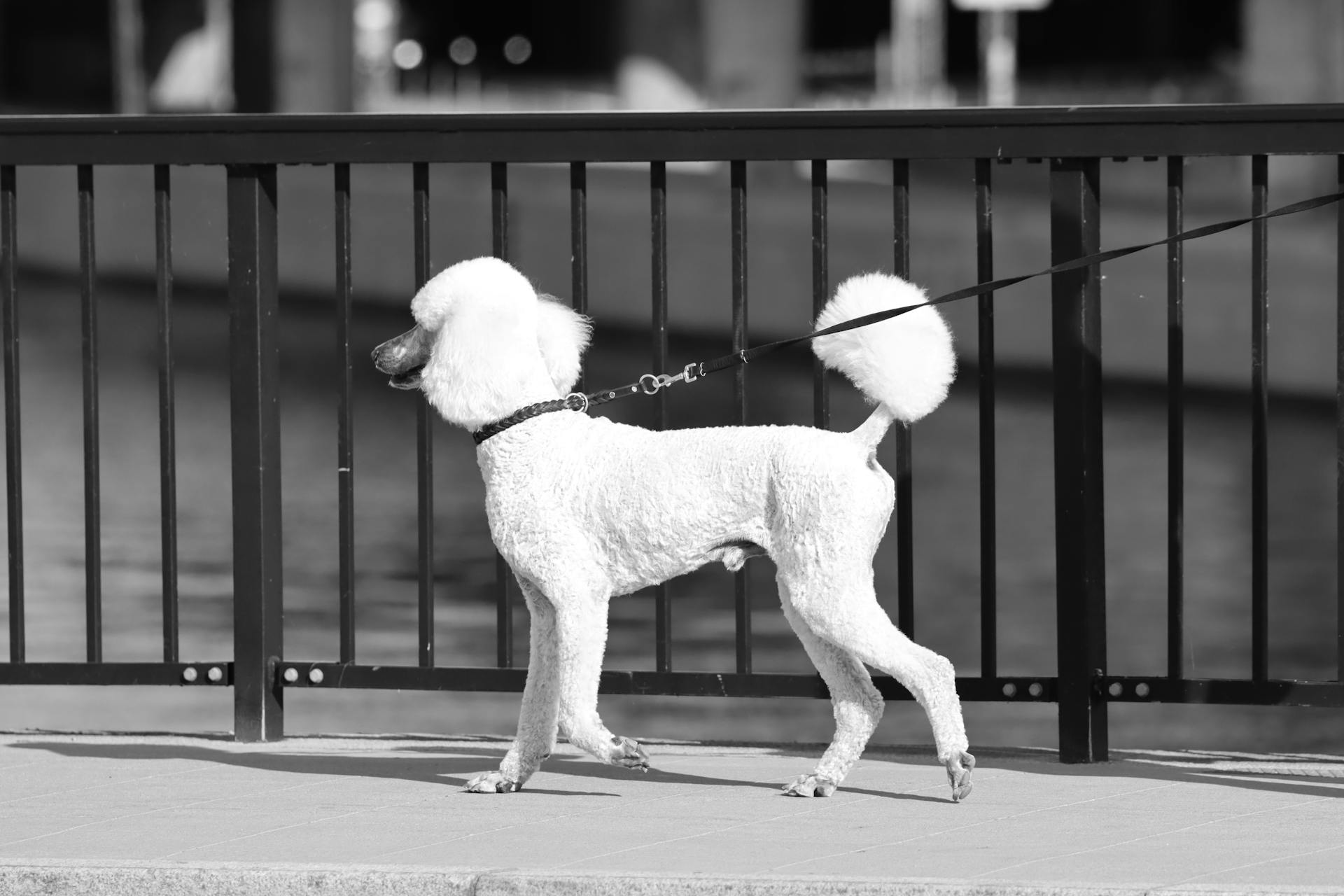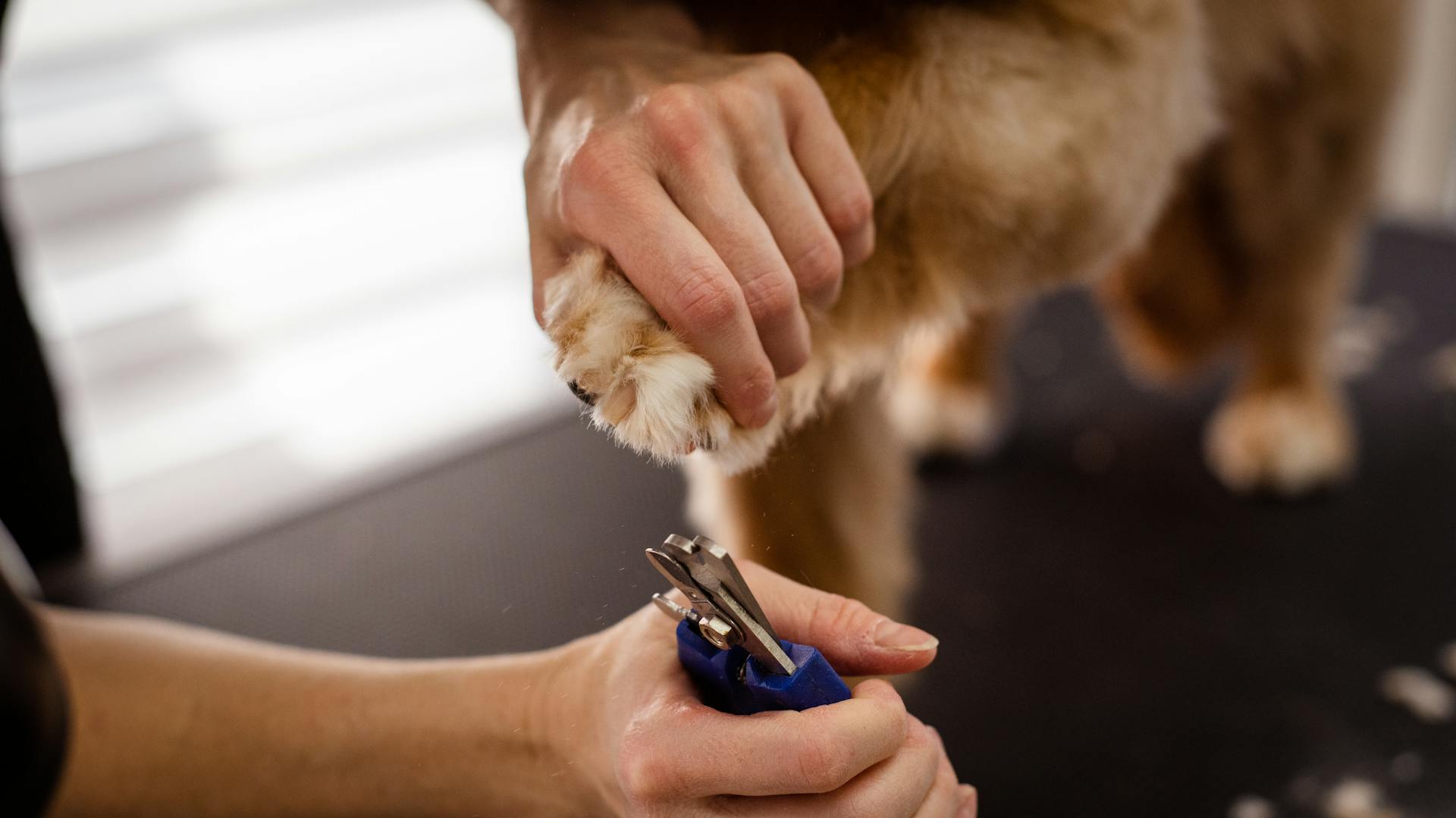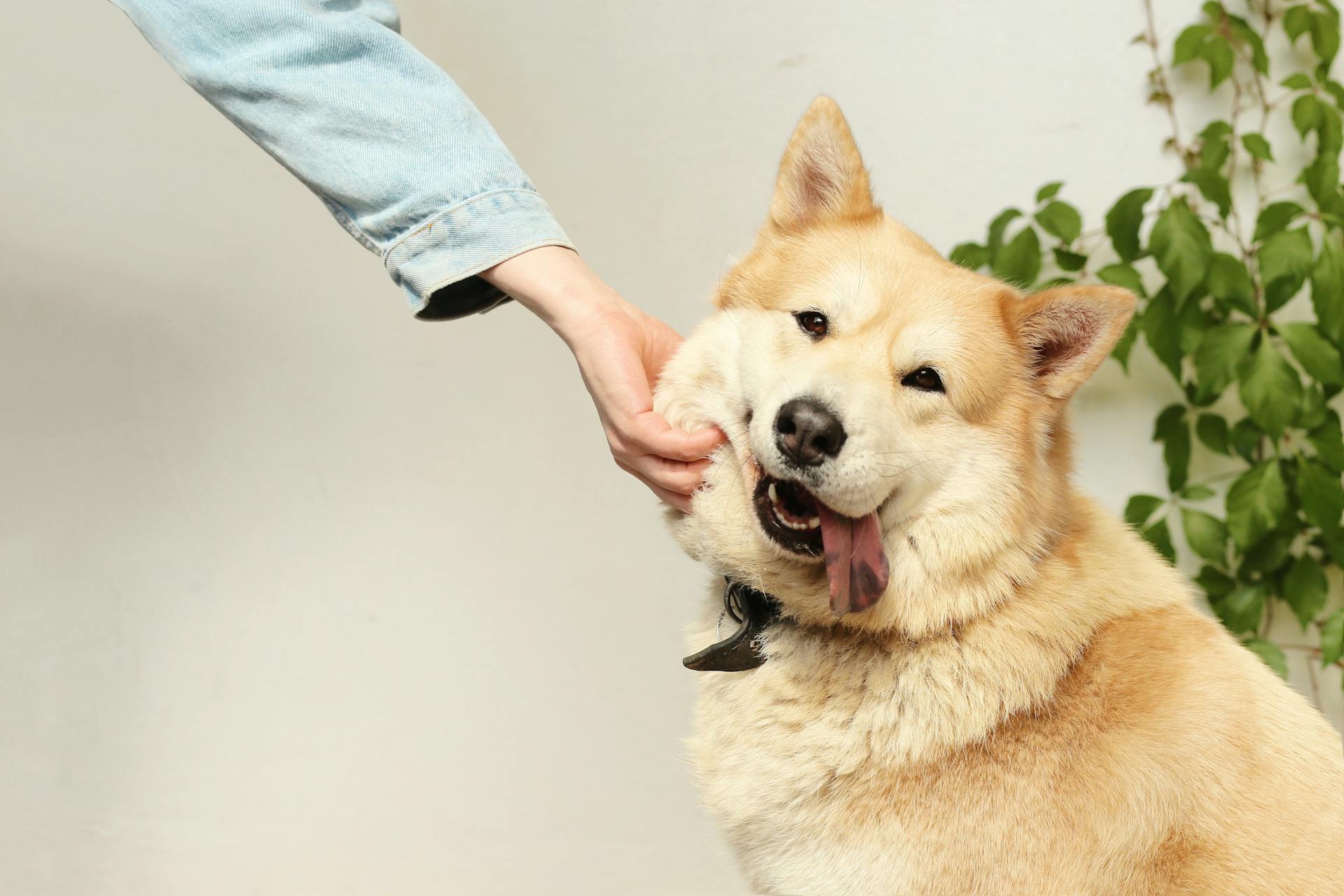
Welcoming a Bernedoodle into your family is a big decision, and with good reason - these adorable hybrids are known for their playful, affectionate nature and low-shedding coat.
First and foremost, Bernedoodles require regular grooming to prevent matting and tangling of their fur. This is especially true for the F1B generation, which tends to inherit the Poodle's low-shedding trait. Regular brushing and occasional trimming will keep your Bernedoodle looking and feeling its best.
A balanced diet is essential for your Bernedoodle's overall health and well-being. This means feeding a high-quality dog food that's rich in protein and fiber, with plenty of fresh water on hand at all times.
In terms of exercise, Bernedoodles are relatively high-energy dogs that need regular physical and mental stimulation. Aim for at least 30 minutes of exercise per day, including walks, playtime, and training sessions.
Readers also liked: Does a Bernedoodle Shed
Nutritional Tips
Proper nutrition is the foundation of a healthy and happy Bernedoodle puppy. Providing your puppy with high-quality food supports its growth, development, and overall well-being.
High-quality puppy food is specifically formulated to meet the nutritional needs of Bernedoodle puppies. Look for puppy food with a high-quality animal protein source, such as chicken, lamb, or fish, as the first ingredient.
Feeding your Bernedoodle puppy on a consistent schedule is important for regulating their digestion and preventing overeating. Feeding your puppy three to four times daily is generally recommended until they are six months old.
You should ask your veterinarian for dietary recommendations that suit your particular dog, as the appropriate amount to feed a Bernedoodle depends on their size, age, and activity level. This means it's highly individualized.
Feeding your Bernedoodle a dog food approved by the Association of American Feed Control Officials (AAFCO) ensures that your canine companion gets a complete and balanced diet.
For another approach, see: What to Feed a Dog with Kennel Cough
Health
The Bernedoodle lifespan is 12-18 years, which is a relatively long time for a dog. This is a significant consideration when deciding to bring a Bernedoodle into your family.
Hip dysplasia is a common health issue in Bernedoodles, where the hip joint becomes loose and painful. It's essential to keep your Bernedoodle at a healthy weight to reduce the pressure on their joints.
Grooming is crucial for Bernedoodles, as their thick coats can lead to skin issues like hot spots. Regular grooming can help prevent these issues and keep your Bernedoodle comfortable.
Some Bernedoodles may be prone to allergies, which can be triggered by their coat. Keeping their coat clean and well-groomed can help reduce the risk of skin issues.
Here are some common health issues to watch out for in Bernedoodles:
- Hip dysplasia
- Elbow dysplasia
- Progressive retinal atrophy (PRA)
- Von Willebrand's Disease
- Skin issues (including allergies and hot spots)
- Epilepsy
- Hypothyroidism
- Gastric dilatation-volvulus (bloat)
- Patellar luxation
- Addison's disease
- Cushing's disease
- Heart issues (such as dilated cardiomyopathy)
Health Needs
A Bernedoodle's lifespan can range from 12 to 18 years, depending on their size. Generally, smaller dogs live longer than larger ones.
Hip dysplasia is a common health issue in Bernedoodles, where the hip joint becomes loose and painful. This can be treated by keeping your dog at a healthy weight, as obesity puts more pressure on their joints.

Elbow dysplasia is another inherited condition that affects the elbow joints, causing pain. Like hip dysplasia, it can be treated with medications, joint supplements, or surgery if severe.
Bernedoodles can also be prone to allergies, which can be caused by food or environmental factors. Signs of allergies include persistent itching or licking, rashes, skin and ear infections, and hair loss.
Skin issues like hot spots can be common in Bernedoodles due to their thick coats. These hot spots are usually caused by excessive licking or chewing of an area, so regular grooming is essential to prevent this.
Regular grooming is also important to prevent dry skin, which can occur if your Bernedoodle is bathed too often. Aim for a bath once a month, max.
If you notice any changes in your pup's eyes, such as cloudiness, redness, or discharge, call your vet. Bernedoodles shouldn't need any special eye care, but it's always better to be safe than sorry.
Here's a list of some common health issues that can affect Bernedoodles:
- Hip dysplasia
- Elbow dysplasia
- Allergies
- Hot spots
- Dry skin
- Eye problems (rare)
It's essential to stay on top of your Bernedoodle's health, especially when it comes to these common issues. Regular check-ups with your vet will help catch any potential problems early on.
Pet Parent Considerations
As a pet parent, it's essential to consider the unique needs of your Bernedoodle. Plan on at least two walks a day to keep your Bernedoodle active, healthy, and entertained.
These dogs need lots of mental stimulation in the form of games, snuffle mats, and puzzle toys. This will help prevent boredom and anxiety, which can lead to destructive behaviors.
Bernedoodles are intelligent and friendly dogs, so they'll thrive with positive reinforcement training and socialization from an early age. With proper care and attention, they can fit in with almost any family.
Keep in mind that Bernedoodles can be prone to skin issues like hot spots, so regular grooming is crucial to prevent these problems. Regular grooming will also help prevent matting and tangling of their thick coats.
As a general rule, Bernedoodles bark infrequently and are more likely to befriend an intruder than scare them away. This makes them a great addition to families with children.
Take a look at this: Why Are Dogs so Careful with Eggs?
Exercise and Play
Exercise and play are crucial for your Bernedoodle's overall well-being. Regular exercise helps keep your puppy physically fit, and daily physical activities strengthen your bond with your furry companion.
Engaging in at least 30 minutes to 1 hour of daily exercise is essential for Bernedoodle puppies, as they require moderate to high energy levels. This can be adjusted as your puppy grows and develops, but over-exercising a young puppy can lead to joint and bone issues.
To provide mental stimulation, interactive toys, puzzle feeders, and training sessions are excellent ways to keep your puppy's mind sharp and prevent boredom. Training sessions help teach important obedience skills and provide an opportunity for mental exercise and bonding.
Here are some fun and engaging activities suitable for your Bernedoodle puppy:
- Leashed walks: Daily walks are a great way for your puppy to explore their surroundings, burn off energy, and practice good leash manners.
- Fetch: Playing fetch with a soft toy or ball combines physical exercise with mental stimulation.
- Tug-of-war: Engaging in a gentle game of tug-of-war builds your puppy's strength and coordination while providing bonding and socialization opportunities.
- Puppy playdates: Arranging playdates with other vaccinated puppies or well-behaved adult dogs provides valuable socialization experiences.
Exercise and Play
Exercise and play are crucial for your Bernedoodle puppy's overall well-being. Engaging in daily physical activities and play helps keep your puppy physically fit and strengthens your bond with your furry companion.
Bernedoodle puppies are energetic, intelligent, and playful, making regular exercise and mental stimulation essential. As a crossbreed between the Bernese Mountain Dog and the Poodle, Bernedoodle puppies inherit a moderate to high energy level, depending on the specific mix of their parent breeds.
To maintain their health and happiness, Bernedoodle puppies require at least 30 minutes to 1 hour of daily exercise. This can be achieved through activities such as leashed walks, fetch, and tug-of-war.
It's essential to balance providing enough exercise to meet their energy needs without overdoing it. Over-exercising a young puppy can lead to joint and bone issues, as their growing bodies are more susceptible to injury.
Here are some fun and engaging activities suitable for your Bernedoodle puppy:
- Leashed walks: Daily walks are a great way for your puppy to explore their surroundings, burn off energy, and practice good leash manners.
- Fetch: Playing fetch with a soft toy or ball is an excellent activity for Bernedoodle puppies, as it combines physical exercise with mental stimulation.
- Tug-of-war: Engaging in a gentle game of tug-of-war with your puppy can help build their strength and coordination while also providing bonding and socialization opportunities.
- Puppy playdates: Arranging playdates with other vaccinated puppies or well-behaved adult dogs can provide your Bernedoodle puppy with valuable socialization experiences while also allowing them to burn off energy through play.
Size
Size is a crucial factor to consider when it comes to exercise and play for your Bernedoodle.
The Tiny Bernedoodle stands at 12 to 17 inches tall at the shoulder, and weighs about 10 to 24 pounds.
Males are generally larger than females.
The Miniature Bernedoodle stands at 18 to 22 inches tall and weighs 25 to 49 pounds.
Their size means they need regular exercise to stay happy and healthy.
The Standard Bernedoodle stands at 23 to 29 inches and weighs 70 to 90 pounds.
This size range requires a good balance of physical and mental stimulation to prevent boredom and destructive behavior.
Children and Pets
Having children and pets can be a wonderful combination, but it's essential to teach kids how to properly treat animals, especially with smaller breeds like Tiny and Miniature Bernedoodles.
Bernedoodles are naturally affectionate and love to play, which makes them a great match for families with kids. They adore spending time with their families and are usually okay with other dogs, but it's crucial to start socialization early and keep it up to ensure they're comfortable around new animals.
If you're considering getting a Bernedoodle, make sure to teach your children how to handle them gently, as they can be injured more easily than larger breeds.
For more insights, see: Bernedoodles and Goldendoodles
Coat and Grooming
Bernedoodles require regular brushing to keep their coats healthy and tangle-free, regardless of their coat type. This is especially important for curly-coated Bernedoodles, which require frequent brushing and grooming to prevent matting and maintain coat health.
The frequency of brushing depends on the coat type: wavy-coated Bernedoodles need regular brushing to prevent matting and tangles, curly-coated Bernedoodles need frequent brushing and grooming, and straight-coated Bernedoodles require regular brushing to remove loose hair and prevent tangles.
Brushing can be a great bonding experience for Bernedoodle owners and their pets, as some Bernedoodle owners brush their dog's coat daily. The thickness of a Bernedoodle's coat helps this breed thrive in cool temperatures while providing them a fair amount of protection from the heat of summer months.
Here's a quick guide to Bernedoodle coat types and grooming needs:
Coat
The Bernedoodle's coat is one of its most distinctive features, and it's a big part of what makes this breed so lovable. They come in a variety of coat types, including wavy, curly, and straight.
Check this out: Bernedoodle Coat Types
Each coat type has its own unique grooming needs, but regular brushing is essential to keep their coats healthy and tangle-free. Wavy-coated Bernedoodles have a loose, flowing coat that requires regular brushing to prevent matting and tangles.
Curly-coated Bernedoodles have tight curls similar to a Poodle and are often considered hypoallergenic due to minimal shedding. However, they require frequent brushing and grooming to prevent matting and maintain coat health.
Straight-coated Bernedoodles have a coat that more closely resembles the Bernese Mountain Dog and may shed more than wavy or curly coats. Regular brushing is still necessary to remove loose hair and prevent tangles.
Here's a quick rundown of the grooming needs for each coat type:
In general, Bernedoodles require lots of consistent brushing, with weekly brushing sessions recommended. This will help keep their coats healthy and tangle-free, and prevent matting and shedding.
Ear
Ear care is crucial for Bernedoodles, especially after a swim, as it prevents moisture and bacteria from accumulating and causing an ear infection.
Cleaning their ears regularly is a must, and it's best to do it every time they're done splashing in water.
Take a look at this: Doberman Ear Cropping Age
Training and Behavior
Training is key to a happy and well-behaved Bernedoodle. Start with basic commands like "sit", "stay", and "come", and gradually introduce more advanced skills as your puppy becomes more proficient.
Interactive toys, puzzle feeders, and training sessions are great ways to engage your puppy's mind and prevent boredom. This mental stimulation is essential for keeping your Bernedoodle's mind sharp.
Bernedoodles are intelligent dogs that love to please, so they're quick to learn. Use positive reinforcement to promote good behavior and encourage your puppy to learn.
Leash training is a must, as Bernedoodles love going on walks. Start immediately to make the process easier for both you and your puppy.
Socialization is crucial for Bernedoodles, as they can be apprehensive around strangers. Introduce your puppy to new people, places, and experiences to help them become confident and affectionate.
With consistent training and positive reinforcement, your Bernedoodle will grow into a sweet and happy dog. They'll be a wonderful lifelong companion for your family.
A unique perspective: Bernedoodle Potty Training
General Information
The Bernedoodle breed originated in 2003 as a cross between a Bernese Mountain Dog and a Poodle. They were bred for companionship and love attention and cuddles from their families.
Bernedoodles are known for their gentle and affectionate nature, making them great companions for families, singles, and seniors alike. They're typically good-natured, friendly, and sociable.
Their intelligence is one of their best qualities, as they're highly trainable with positive reinforcement methods. They can learn bad habits just as easily as good ones, so consistent training is essential.
Here's a breakdown of Bernedoodle sizes:
Their moderate energy levels make them adaptable to different lifestyles, but they still need regular exercise and mental stimulation to stay happy and healthy.
Overview
The Bernedoodle is a cross between a Bernese mountain dog and a Poodle, first introduced in 2003. They were bred solely for companionship, making them love attention and lots of cuddles from their families.
This breed is known for their gentle and affectionate nature, being typically good-natured, friendly, and sociable. They're great companions for families, singles, and seniors alike.

Bernedoodles are highly intelligent, usually very smart and trainable. They pick up commands quickly and enjoy mental stimulation through training and interactive play.
Their coat is often low-shedding or non-shedding, making them a more suitable option for people with allergies or those who prefer a cleaner home environment. In some cases, a Bernedoodle can have a straighter coat similar to that of a Bernese mountain dog, which sheds more and might not agree with an owner who's allergic to pet dander.
Bernedoodles come in various sizes, depending on the size of the Poodle parent used in breeding. They can range from standard to miniature to tiny (also known as toy Bernedoodles), offering options for different living situations and preferences.
Here are the different sizes of Bernedoodles and their typical weights:
They generally have moderate energy levels, which means they're adaptable to different lifestyles and can be content with both indoor playtime and outdoor adventures. However, Standard Bernedoodles do best with a fenced-in yard to run around and play in.
Bernedoodles are responsive to training, but their unique personalities can make them unpredictable at times. They require positive reinforcement and patience, especially when they inherit the Bernese's willfulness or the poodle's high energy.
Overall, Bernedoodles are a great choice for families or individuals looking for a lovable, smart mixed-breed with good health that will put a smile on their face with their antics.
Consider reading: Mini Bernedoodle Energy Level
History

The Bernedoodle is a relatively new breed, first introduced in 2003. Sherry Rupke of Swissridge Kennels is credited with intentionally breeding Poodles and Bernese Mountain Dogs to create the Bernedoodle.
The Bernedoodle was bred solely for companionship, making them perfect for families who want a loving and loyal pet. They thrive on attention and cuddles from their families, and they're just as happy curling up on the couch as they are hiking a trail alongside their humans.
The Bernedoodle is not recognized by the American Kennel Club, but it is recognized by several other organizations, including the American Canine Hybrid Club and the International Designer Canine Registry.
Here are some organizations that recognize the Bernedoodle breed:
- American Canine Hybrid Club
- Designer Dogs Kennel Club
- International Designer Canine Registry
- Designer Breed Registry
Sherry Rupke's goal in breeding the Bernedoodle was to create a breed that was more allergen-friendly and free from the health issues that plague Bernese Mountain Dogs. She successfully achieved this goal, and now dog owners everywhere have fallen in love with the loyal and loving Bernedoodle.
Frequently Asked Questions
Do Bernedoodles bark a lot?
Bernedoodles are known to be quiet dogs, barking infrequently. With proper training, they can be even less likely to bark excessively.
Can Bernedoodles be left alone?
Bernedoodles may not be suitable for extended periods of alone time due to potential separation anxiety. Training and proper care can help mitigate this issue
Are mini Bernedoodles high maintenance?
Mini Bernedoodles have low-maintenance coats, but still require regular brushing and occasional professional grooming to prevent matting. With proper care, they can be a wonderful, low-fuss companion.
What are the cons of a mini Bernedoodle?
Mini Bernedoodles may be prone to inherited health issues such as hip dysplasia, elbow dysplasia, and eye problems, which can lead to costly veterinary expenses
Sources
- https://www.littletetondoodles.com/how-to-care-for-bernedoodle-puppies/
- https://dogtime.com/dog-breeds/bernedoodle
- https://www.dailypaws.com/dogs-puppies/dog-breeds/bernedoodle
- https://www.downhomedoodle.com/post/the-temperament-of-bernedoodle-all-you-need-to-know
- https://www.petmd.com/dog/breeds/bernedoodle
Featured Images: pexels.com


